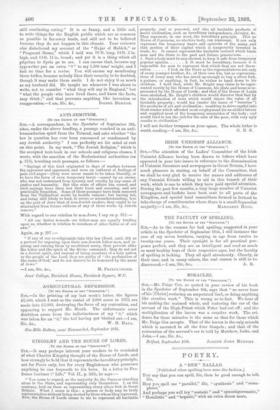KINGSLEY AND THE HOUSE OF LORDS. [To THE EDITOR OF
THE " SPFOTATOR."] Sin,—It may perhaps interest your readers to be reminded of what Charles Kingsley thought of the House of Lords, and how strongly he held that it represents the hereditary principle, not for Peers only, but for every Englishman who possesses anything he can bequeath to his heirs. In a letter to Pro- fessor Lorimer (" Life," Vol. II., p. 243), he says :— " You seem to regard, as the majority do, the Peers as standing alone in the State, and representing only themselves. I, on the contrary, look on them as representing every silver fork in Great Britain. What I mean is this : a person or body may be truly representative without being elected by those whom they represent. Now, the House of Lords seems to me to represent all heritable
property, real or personal, and also all heritable products of moral civilisation, such as hereditary independence, chivalry, ckc. They represent, in one word, the hereditary principle. This no House of Commons, no elective body, can represent. It can only represent the temporary wants and opinions of the many, and that portion of their capital which is temporarily invested in trade, Am. It cannot represent the heritable instinct which binds
man and the State to the past and future generations 1. Such a body must be non-elected, to keep it safe from temporary popular opinion 2 It must be hereditary, because it is impossible for men to represent that which they are not them- selves I look on the Peers as the representatives not only of every younger brother, dm., of their own kin, but as representa- tives of every man who has saved up enough to buy a silver fork, a picture, or anything, in fact, he wishes te hand down to his children. I hold that, while Mr. Bright may claim to be repre- sented merely by the House of Commons, his plate and home is re- presented by the House of Lords ; and that if the House of Lords were abolished, Mr. Bright's children would discover that fact by the introduction of laws which would injure the value of all heritable property ; would tax (under the name of " luxuries ") the products of art and civilisation ; would try to drive capital into- those trades which afforded most employment for en-skilled labour and supplied most of the temporary necessities of the body; and would tend to tax the rich for the sake of the poor, with very ugly results to civilisation."
I will not further trespass on your space. The whole letter is
worth reading.—I am, Sir, &c., G. E. S.


































 Previous page
Previous page